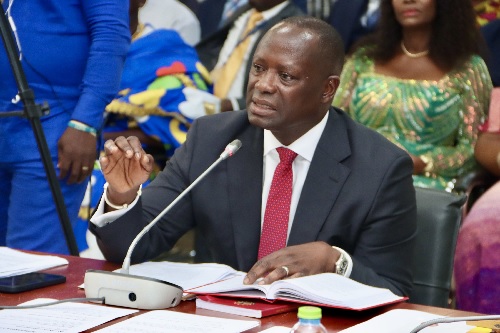
Issuance of forest reserve mining licences will be stopped - Armah-Kofi Buah assures
The Minister designate for Lands and Natural Resources, Emmanuel Armah-Kofi Buah, has affirmed his commitment to stop the issuance of licences to companies to mine in the country’s forest reserves.
He said stopping the issuance of mining licences would stop opening Ghana up to further damage to its forest covers and waterbodies.
“If you give me the chance, my first activity will be to ensure that there will be no new mining activities in forest reserves,” he assured.
Question
Appearing before the Appointments Committee of Parliament last Monday, Mr Buah said, “We have said that there will be no new mining activities in forest reserves and the intention is to make sure that L.I. 2462 is amended to ensure that the provision allowing for mining in reserves is not in place.”
He made the statement after the Member of Parliament for Damango, Samuel Abu Jinapor, had quoted a call by President John Dramani Mahama for the ban on all mining in forest reserves.
A former Minister of Lands and Natural Resources, Mr Jinapor, also cited how a number of companies such as the Newmont the Golden Ridge Ltd, AngloGold Ashanti, Golden Star Wassa Ltd, Ghana Bauxite and the Ghana Manganese Ltd had been mining in various forest reserves over the years, making contributions to Ghana’s GDP.
He, therefore, sought to know when the President’s commitment to ban mining in forests would be effected.
Initiatives
Responding, Mr Buah, who is the MP for Ellembele, told the committee that it was not as a result of the mining operations of reputable international companies in Ghana’s Forest reserves that “our forests are bleeding today.”
He gave the assurance that he would stop illegal mining activities in the forest reserves with some initiatives the government would introduce soon.
He named them as the Blue Water initiative to improve and harness degraded land and the Tree For Life initiative to enhance afforestation.
“These initiatives will help to make sure we harness our forest and bring biodiversity and the ecological life of our forests,” he said.
Decentralising mining operations
The MP for Tamale North, Alhassan Sayibu Suhuyini, asked the nominee what strategic policy he would implement to combat illegal mining effectively while balancing the need for sustainable livelihood for local communities.
Answering, Mr Buah said per the statistics, three million Ghanaians were engaged in illegal mining in 12 regions across the country.
He said such a problem was one that the government could not wish away and so “we need to tackle it and tackle it well”.
To ensure mining was done legally in those areas, he said the government would decentralise the operations of regulatory institutions.
“This is because one of the reasons so many people engage in illegal mining is that the process for getting a licence sometimes is so cumbersome and so long unless you have a political connection.
“Thus decentralising these services will allow these communities to now know that if you want to do legal mining, this is the channel to register for your licence,” he said.
Categorising mining
He added the government would also re-categorise mining to allow for easy monitoring and supervision of mining activities, as well as build the capacity of small-scale miners to upscale.
He added that the government would also create cooperatives and the Gold Board to work with universities and geologists to be in the same location to identify areas where gold was located.
“The intention is to create a system that allows everybody to see that it is easy to do legal mining,” he said.
Water guards
On curbing pollution of waterbodies, Mr Buah said the government would create water guards who would be trained on the impact of illegal mining and “fight for the soul of our country-waterbodies”.
He said the guards would replace the military in the fight against illegal mining.
